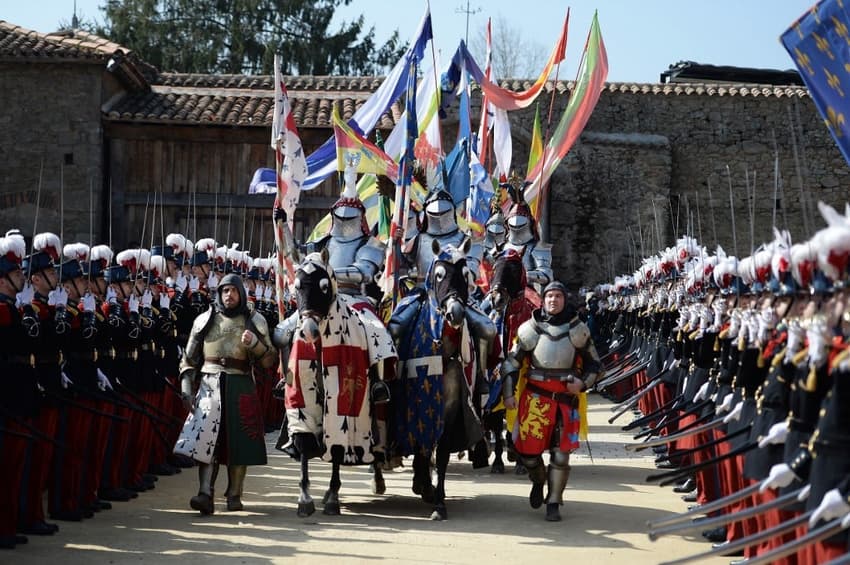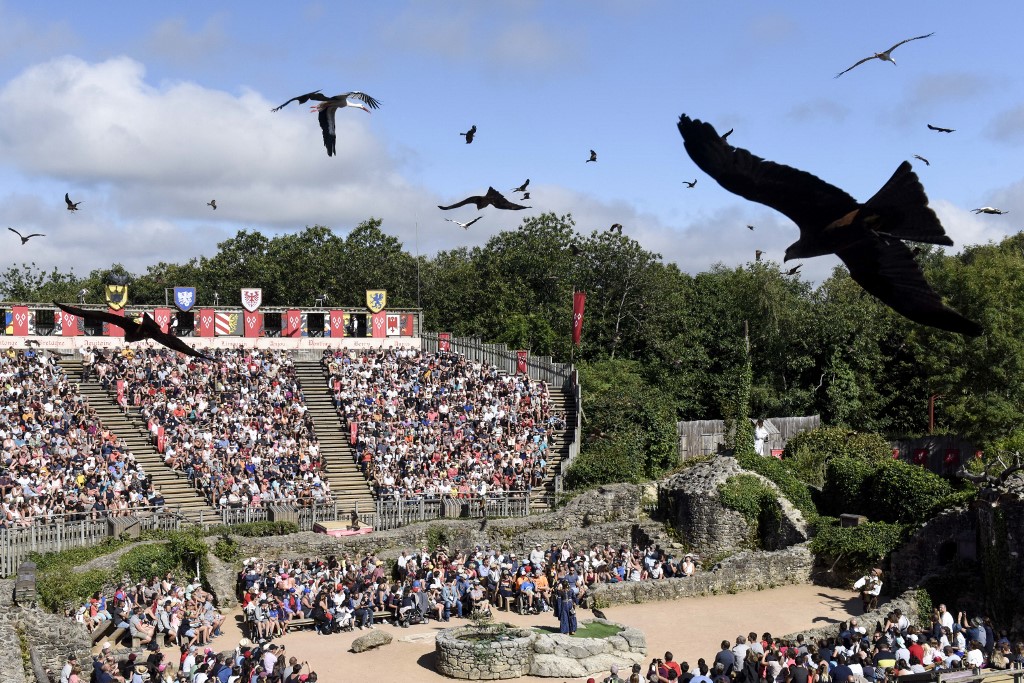Puy du Fou: 5 things to know about France's huge historical theme park

France's biggest historical theme park has had its best ever year - attracting a massive 2.5 million visitors to see its historical villages and reenactments.
Here's what you need to know about it;
It's popular
Bosses at the Puy du Fou theme park in Vendée, western France, announced on Thursday their best ever season, with 2.5 million visitors over the 2023 season.
It is France's third most popular theme park - after Disneyland Paris and Parc Asterix (dedicated to the comic book hero).

The park is known for its spectacular reenactments of historical events. Photo by SEBASTIEN SALOM GOMIS / AFP
It's all about history
The huge site - situated roughly halfway between Nantes and La Rochelle in the Vendée département - offers recreations of scenes from French history, from a Roman ampitheatre to a Medieval village.
It's known for its spectacular reenactments of events such as Viking raids and the military battles of the Napoleonic era.
Well, a certain type of history
It's hugely popular, especially with families, but the park's owners have a reputation for putting a certain political slant on the history that they present.
It was set up in 1977 by Vendée local Philippe de Villiers, who has been involved in several very right-wing political movement and is an avowed monarchist.
It's fair to say that the park is traditional in the way it presents history - and of course the French are always the good guys. Whether this is merely about making the visit entertaining for children or has a more overt political message is hotly debated.
It's growing . . .
These days Puy du Fou is run by Philippe's son Nicolas de Villiers and has been steadily growing in both popularity and ambition - in 2021 Puy du Fou Espana - near Toldeo in Spain - was opened.
. . . and branching into film
In 2022 the park released a film. Titled Vaincre ou Mourir (victory or death) the historical drama used the park as a backdrop, and told the story of La guerre de Vendée - the Vendée war against the French Revolution, which happened in the 1790s.
Historians slated the film both for its historical inaccuracy and its attempt to present as a documentary, rather than the drama it actually is.
Some people went further and denounced the film as reactionary propaganda, the left-wing newspaper Libération ran a front page calling it Puy du Fourbe (a pun that loosely translates as ‘the cunning park’).
Comments
See Also
Here's what you need to know about it;
It's popular
Bosses at the Puy du Fou theme park in Vendée, western France, announced on Thursday their best ever season, with 2.5 million visitors over the 2023 season.
It is France's third most popular theme park - after Disneyland Paris and Parc Asterix (dedicated to the comic book hero).

It's all about history
The huge site - situated roughly halfway between Nantes and La Rochelle in the Vendée département - offers recreations of scenes from French history, from a Roman ampitheatre to a Medieval village.
It's known for its spectacular reenactments of events such as Viking raids and the military battles of the Napoleonic era.
Well, a certain type of history
It's hugely popular, especially with families, but the park's owners have a reputation for putting a certain political slant on the history that they present.
It was set up in 1977 by Vendée local Philippe de Villiers, who has been involved in several very right-wing political movement and is an avowed monarchist.
It's fair to say that the park is traditional in the way it presents history - and of course the French are always the good guys. Whether this is merely about making the visit entertaining for children or has a more overt political message is hotly debated.
It's growing . . .
These days Puy du Fou is run by Philippe's son Nicolas de Villiers and has been steadily growing in both popularity and ambition - in 2021 Puy du Fou Espana - near Toldeo in Spain - was opened.
. . . and branching into film
In 2022 the park released a film. Titled Vaincre ou Mourir (victory or death) the historical drama used the park as a backdrop, and told the story of La guerre de Vendée - the Vendée war against the French Revolution, which happened in the 1790s.
Historians slated the film both for its historical inaccuracy and its attempt to present as a documentary, rather than the drama it actually is.
Some people went further and denounced the film as reactionary propaganda, the left-wing newspaper Libération ran a front page calling it Puy du Fourbe (a pun that loosely translates as ‘the cunning park’).
Join the conversation in our comments section below. Share your own views and experience and if you have a question or suggestion for our journalists then email us at [email protected].
Please keep comments civil, constructive and on topic – and make sure to read our terms of use before getting involved.
Please log in here to leave a comment.